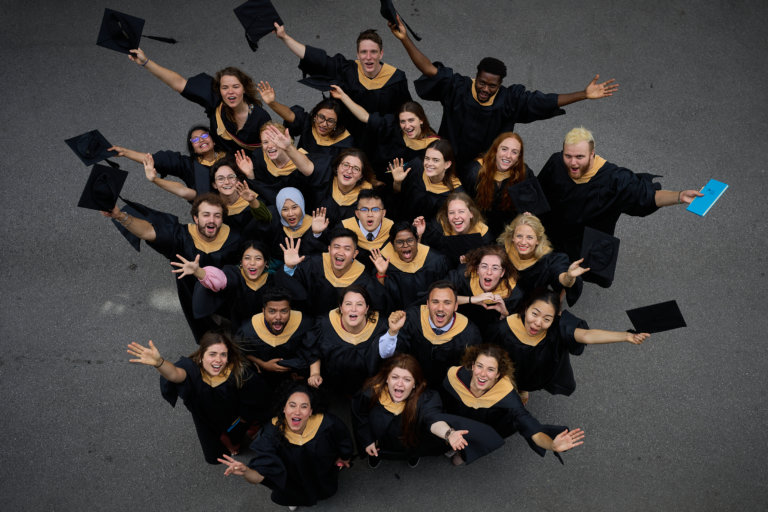
From war to poverty, deforestation to epidemics, we live in demanding times and face detrimental challenges. The world could do with a little more love and care right now. Perhaps more importantly, we need more knowledge and expertise on how to create a positive impact among people, communities and nations.
International Relations offers a powerful lens to understand and address global challenges. It explores economics, culture, education, and political science, revealing their interconnectedness and impact on society. It provides a deep understanding of nations, governments, and individuals and why they respond as they do, equipping you to navigate the complexities of an increasingly interconnected changing world.
A master’s degree in International Relations is one of the most effective ways for you to achieve this. You’ll gain valuable, transferable skills like communication (written and spoken), cross-cultural awareness, persuasive argumentation, and teamwork. These skills pave the way for a career in research, politics and government and in fields like management, conflict resolution, advocacy, and social work.
If this sounds like the future you envision, start with a master’s degree in International Relations from the following universities:

The Department of International Relations at Central European University gets students ready for a wide range of careers. Source: Central European University
Central European University
In the QS World University Rankings by Subject 2023, Central European University ranks #26 in the field of Politics and International Studies. It’s a strong show of the Department of International Relations’s academic strength and graduate employability. Evidence of the latter can be found in the various governments and organisations around the world as well. CEU graduates often progress to careers both in academia and industry, from think tanks and NGOs to international organisations and major consultancy firms within six months of graduation.
Besides a more extensive two-year programme (ideal for those who seek an in-depth understanding in special areas of International Relations, such as security studies or international political economy), the department offers more intensive one-year programmes: one (Vienna track) with a slightly more academic focus and another with a more professional focus (New York City track). Both program options feature a highly multicultural student body and a low 7:1 student-faculty ratio conducive to the development of critical thinking and the exploration of individual research interests.
There are opportunities to go abroad and experience another culture, language, environment and education system as well. The Open Society University Network Mobility Programme and mobility opportunities through the CIVICA network, to name just two, are embedded and form an integral part of the study programme.
In Austria, the US, or wherever their studies take them, CEU students always learn from and with a global student body and faculty. As International Relations straddles many disciplines and geographies, having different, diverse and broader perspectives is invaluable. Pair this with the unique set of skills, knowledge and experience gained from their CEU degree, and students are ready for a wide range of career pathways. To learn more about CEU, a university in service of the principles of Open Society, and what you can gain from its International Relations programmes, click here. Comprehensive financial aid, including tuition waivers and monthly stipends, is available.

The one-year Master’s in International Relations at Leiden University is exciting and challenging — a good mix of theoretical knowledge and practical experience. Source: Leiden University/ Facebook
Leiden University
Established in 1575, Leiden University is one of Europe’s leading international research universities. The University has seven faculties, with one among them being the Humanities, which consistently ranks in the top 30 Humanities departments worldwide in Times Higher Education World University Rankings 2023.
Here, you’ll find the MA in International Relations programme that offers a humanities-based approach to International Relations, blending ideas in world politics with historiographical, cultural, and area studies teaching and research in ways that connect global and local processes and dynamics.
Boasting a unique and broad curriculum, this programme allows you to tailor your degree to suit your career goals. What’s more, it is the only master’s programme in the Netherlands, offering five distinct specialisations — Culture and Politics, European Union Studies, Global Conflict in the Modern Era, Global Order in Historical Perspective, and Global Political Economy.
What truly sets this programme apart is the humanities-based approach. It’s not just about memorising facts; it’s about understanding how people across cultures interpret the world and how those interpretations impact global dynamics. You’ll dig deep into history, explore diverse cultures, and gain a better understanding of the human condition, all while honing your analytical skills and critical thinking.
This holistic approach equips you with the tools to become a well-rounded professional ready to tackle the ever-evolving International Relations challenges. The best part? A special agreement allows you to earn a second degree at the European Campus of Johns Hopkins University SAIS in Bologna, Italy.
Graduates of the programme find themselves in diverse roles across sectors, from shaping policy in government bodies to advocating for change in NGOs.

University of Bristol’s MSc International Relations requires students to complete mandatory and optional units in the School of Sociology, Politics, and International Studies. Source: University of Bristol/Facebook
University of Bristol
Nestled in a vibrant port city, the University of Bristol is the 55th best globally (QS World University Rankings 2024). At the heart of this academic powerhouse lies the School of Sociology, Politics and International Studies (SPAIS), an interdisciplinary hub where leading scholars produce cutting-edge research relevant to our interconnected world.
Its strong reputation is evident across all the postgraduate programmes, including MSc Gender and International Relations, MSc International Relations, MSc Society, Politics and Climate Change, MSc International Security and more.
The MSc International Relations programme, in particular, provides a broad overview of the field, integrating theory with the study of diverse cases and issues. It delves into the blurring lines between the domestic and international spheres, examining the impact of trade, finance, environment, strategy, ideology, culture, and ethics on global affairs.
Upon graduation, Bristol students are highly sought-after by employers, with a proven track record of successful career placements. Many graduates pursue careers in the civil service, NGOs, and charities, utilising their MSc degrees and valuable volunteer or internship experience. Alumni have secured positions with organisations like Refugee UK, Shelter, Barnardo’s, Amnesty International, government departments, and the European Parliament.
Debora Oddo, an MSc in International Relations graduate, exemplifies the impact of this programme. “I am now working as an intern in the Division of Water Sciences of UNESCO (Paris),” she says. “ I got the internship, especially thanks to my preparation in International Human Rights, which I got in Bristol. In five years’ time, if I continue on this path, I see myself working for one of the UN agencies around the world.”
*Some of the institutions featured in this article are commercial partners of Study International







